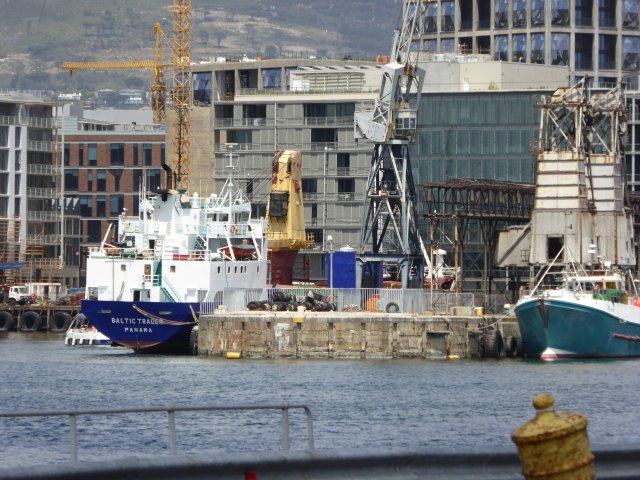We have been in Cape Town now for four days, having arrived via Glasgow and Heathrow on Monday. It has been a wonderful experience – details to follow. Our ship is due to leave next Thursday – the reality of what we are doing will catch up with us after that time.
I hope to put all manner of stories on this site – including our experiences with the islanders and the expats on the island, historical details that we come across, details of the various human activities, details on the bird life on the island, and of course information on the farming.
I have been pondering a comparison between farming in mainland Scotland and farming on a remote island.
No doubt, there are some advantages in a remote farming situation. For example, there is a huge oceanic barrier against the possible entry of pests and diseases. On the mainland, diseases of livestock and of crops can be brought in to a farm by many vectors, including wind, vehicle wheels, animals and birds. Farmers have to be on the alert for problems on a continuous basis. In addition, there is a well-developed infrastructure of vets, advisers, laboratories and suppliers, to help the farmer with any incident that may arise. Clearly, in Tristan such a support infrastructure is out of the question and in the event of problems the farmers have to rely on support organisations that can take many weeks to access, and remedies can take many weeks to arrive. The other consideration is that many livestock problems fall into the categories of conditions that are induced by feed or environmental conditions, and these problems can occur whether you are farming in a remote island or in a mainland situation – I am thinking of conditions such as milk fever, acetonaemia, bloat and of course calving difficulties.
In terms of all pests and diseases, and of introduced species such as invasive plant weeds, the oceanic barrier that serves to protect the island is only good until it is penetrated. Great care has to be taken not to introduce problems, particularly with imported livestock and plants. But also we need to have a clear picture as to what has come in through the actions of Man in the last 200 years. There seems to be little point going to extreme lengths to prevent the introduction of a disease if that disease is already widespread on the island.
Within the farming structure of Scotland, farmers have a great inter-dependency largely so that specialist livestock production can be concentrated on the conditions for which it is most suitable. Hill farmers will sell ewe lambs to upland farmers, who then cross them and then sell the resulting lambs to lowland farmers to be further crossed to produce the lamb for the butcher. Equally, hardy beef cattle from upland areas are sold on to lowland farmers to be finished on quality grass, or to be used to produce a further generation of crossbreeds. In the recent annual Bull Sales in Stirling, no fewer than 856 pedigree bulls were sold by specialist producers to farmers in other areas, including England, Wales and the Continent. Clearly, these mutually beneficial trading relationships are not available to farmers on the Island.
There are other ways in which farmers in mainland Scotland can help each other. This extends from the formal buyer groups and machinery rings, to farm contractors, to informal chats and the sharing of ideas. It is only the last ‘informal chat’ category that is available to farmers on the Island.
It may be imagined that as I wait in Cape Town for the ship to take me to my new challenge, I find the conditions I am going to quite daunting. In the months since my appointment I have tried to carry out research and to develop contacts as much as possible, but I cannot prepare for everything. I am also strongly aware of the necessary timescale for the implementation of measures of improvement – the sequence of advocacy – debate – decision making – funding – shipping could easily take 12 months – and we are only 24 months on Tristan!


Normally not communicative on flights, I met you, Bee, en route to Amsterdam from Toulouse in late September. We didn’t stop chatting!! I was fascinated by the Tristan da Cunha lifestyle you and your husband were to experience. I have read the first posting here with great interest and will avidly follow subsequent ones. My husband and I are from Scotland and have led a peripatetic life since we married, and now live in a very rural and peaceful area of SW France. Perhaps because of our own lifestyle over the years, from the frozen lakes in Finnish Lapland to the Andean heights in Venezwuela, I could relate to your excitement and anticipation of a new adventure! Good luck, Bee, to you both, and enjoy the many interesting challenges ahead!